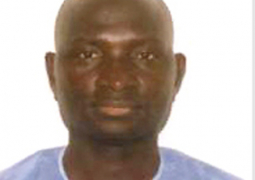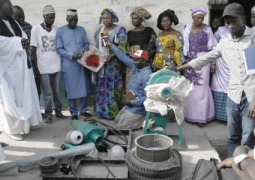The Ministry of Health and its partners yesterday held a press briefing for journalists, coinciding with the commemoration of Africa Vaccination Week 2013.
The Ministry of Health and Social Welfare, in collaboration with WHO, UNICEF, Rotary International and other partners, will from 24 to 27 May 2013 hold National Immunisation Days (NIDs) against poliomyelitis.
The four-day exercise, which will be conducted simultaneously in all countries in the West African region, is part of the national, regional and global efforts to eradicate poliomyelitis.
During these days, health officials will be dedicating their time to vaccinating all children below the ages of 5, by giving them doses of the oral polio vaccine, free of charge, irrespective of their previous immunisation status.
Speaking at a briefing held at the health ministry in Banjul, the permanent secretary at the Ministry of Health and Social Welfare, Matilda Bouye, said WHO, African Region and national governments have agreed to set aside Africa Vaccination Week each year to celebrate and create increased demand for vaccination.
She said the home-grown initiative has an overarching goal of strengthening immunisation programmes in the African Region, by drawing attention to, and increasing awareness of the importance of every person, particularly every child’s and women’s needs and rights to be protected from vaccine preventable diseases.
“Immunisation remains one of the most highly cost effective public health interventions with the potential to reduce both morbidity and mortality, due to vaccine preventable diseases; Furthermore, immunisation against childhood infections diseases has saved more lives than most other public interventions.”
While stating that The Gambia is on track on most of the health-related MDGs, he said, it has to be highly commended for the conducive environment created by the government, under the leadership of President Jammeh, whom he said, has brought health services to the door steps of all and sundry.
She stated that the slogan of the Africa Vaccination Week is “Vaccinated communities, healthy communities.”
Noting that the objective of the African Vaccination Week is to strengthen national immunisation programms by raising awareness on the value and importance of immunisation services, he underscored the importance of increasing vaccination coverage and undertaking of new and existing vaccines.
For his part, Dr. Thomas Sukuwa, WHO country representative, said the annual implementation of this week serves as an overreaching framework for all initiatives that are dedicated to promoting the importance of immunisation of all targeted age groups and universal access to this essential preventive intervention in all countries.
“The focus this year is to reduce the number of unimmunised children, through reinforcing routine immunisation which is the backbone for the interruption of wild poliovirus, and introduction of new life saving vaccines in order to contribute significantly to the achievement of the Millennium Development Goal 4,” he said.
He revealed that a newly “developed meningococcal, a meningitis conjugate vaccine has been rapidly introduced in 10 hyper endemic countries within the meningitis belt of west and central
He said the region has recorded 63% reduction in the number of wild poliovirus cases from 350 cases in 12 countries in 2011 to 128 cases, in just 3 countries in 2012.
He said



